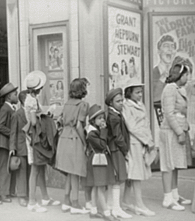
"Children in front of moving picture theater, Easter Sunday matinee, Black Belt, Chicago, Illinois" (Detail)
Credit and Original Image
Search this site:
Campus Resources
Black Film Course Offerings 2004-05
20200. Sisters in Cinema (=GNDR 20200):
This survey course examines the Hollywood and independent films and careers of black women filmmakers who began producing work primarily after the Civil Rights Movement. Concentrating on the race, gender, and cultural movements of the late 20th century and the technological innovations that led to a democratization in media production, the films of black women directors will be examined with regard to traditional Hollywood hegemonic practice, independent film alternative systems, and the emergence of hip-hop inspired financing, production, distribution, and marketing strategies. Y. Welbon. Autumn.
26100. Spike Lee (=AFAM 21401, ENGL 27902):
This course surveys what Wahneemah Lubiano calls, "the Spike Lee Discourse" - the films and other media work Lee has produced, alongside the public persona he has constructed through his appearances in print media, television, advertising and the Internet. How has Lee negotiated (and influenced) the realms of independent and Hollywood filmmaking traditions and institutions? How does he (as director, writer, producer, actor, author, entrepreneur, advertising executive) push the boundaries of auteur approaches to reading his films, as well as traditional definitions of African American cinema? How can we talk about Lee's career as a reflection of post-classical cinematic sensibilities and marketing strategies? How has he drawn from and shaped discourses on Black masculinity, entrepreneurship, and cultural politics? We will watch Lee's films (possibly in conjunction with a Doc Films series) from his student thesis film Joe's Bed-Stuy Barbershop: We Cut Heads (1982) to Bamboozled (2000), read his writings, survey critical literature on his work, and place him in a series of critical/political constellations (e.g., the Black Arts movement and collective cultural production; Afrocentricity; Black conservativism; hip hop aesthetics). J. Stewart. Spring.(G/D/S)
41100. African American Literature on Film (=ENGL 47100):
This course surveys a range of 20th century African American literary works that have been adapted to the screen in order to explore the formal and stylistic relationships between literature and the cinema, as well as our approaches to them as objects of study. How are different literary forms and genres and approaches (i.e., novels, plays, short stories, poetry, autobiography, melodrama, social realism) translated into cinematic terms? What tools of literary analysis can or should we bring to the interpretation of cinematic texts - adaptations and others? How can we think about the "authorship" of an adaptation? How are films with Black literary origins presented to and received by different readers/audiences? We will pay particular attention to the ways in which race inflects issues of production, representation and address between literary and cinematic institutions. Texts include essays on adaptation by Bazin, Eisenstein, Naremore and cases of adaptation such as A Raisin in the Sun; Native Son; "King of the Bingo Game"; Cotton Comes to Harlem; The Color Purple; Daughters of the Dust. J. Stewart. Spring.